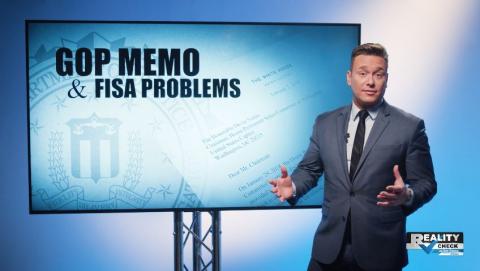Friday, the White House released a controversial memo meant to provide some context to the whole Trump/Russia investigation.
The Nunes memo is four pages long, and it explains many of what seem to be very questionable actions by the Department of Justice and the FBI in how they got their hands on FISA warrants on Trump campaign officials.
But more than just this case, this memo backs up what civil libertarians have been screaming about for years. And begs the question—can the FISA court system actually be trusted?
Let’s give it a Reality Check you won’t get anywhere else.
First, let’s start with the Nunes memo. It was long anticipated. So what did it show?
The memo focuses in part on the Foreign Intelligence Surveillance Act (FISA) warrants that authorized the surveillance of former Trump campaign foreign policy adviser Carter Page.
First, The memo claims that, “On Oct. 21, 2016 the DOJ and FBI sought and received a FISA probable cause order authorizing electronic surveillance on Page.”
According to the memo, “The FBI and DOJ obtained one initial FISA warrant tareting Carter Page and three FISA renewals from the FISC.”
“…Then-FBI Director James Comey signed three FISA applications on behalf of the FBI, and Deputy Director Andrew McCabe signed one.”
The memo also says, “Then-DAG [Deputy Attorney General] Sally Yates, then-Acting DAG Dana Boente, and DAG Rod Rosenstein each signed one or more FISA applications on behalf of the DOJ.”
Now, where things get interesting is when you bring in that infamous Trump dossier.
It was created by former British Spy Christopher Steele on behalf of the DNC and the Clinton campaign.
The memo states that, “Neither the initial application for the warrant in October 2016, nor any of the renewals, disclose or reference the role of the DNC, Clinton campaign, or any party/campaign in funding of Steele’s efforts.”
That’s despite the fact that we know Steele was paid more than $160,000, and even though the memo states that both the DOJ and the FBI were aware of the Democratic Party funding of the dossier.
The memo claims that in the Carter Page FISA application a Yahoo News article was cited extensively. But the memo states that the article did not corroborate the Steele dossier because “it was derived from information leaked by Steele himself to Yahoo News.
In fact, the memo says that the FISA application “incorrectly asses that Steele did not directly provide information to Yahoo News. Steele has admitted in British court filings that he met with Yahoo News and several other outlets in September 2016 at the direction of Fusion GPS.”
The memo also claims that, “before and after Steele was terminated as a source,” which by the way was, according to the memo, because of unauthorized disclosure to the media of his relationship with the FBI, Steele “maintained contact” with the DOJ through then-Associate Deputy Attorney General Bruce Ohr.
Ohr, who worked closely with Yates then Rosenstein, eventually spoke with the FBI about his communications with Steele.
In September 2016, Steele apparently told Ohr he was “desperate that Donald Trump not get elected and was passionate about him not being president,” according to the memo.
And the memo also notes Ohr’s wife worked for Fusion GPS to help with the opposition research against Trump, something the memo claims was—once again—not disclosed.
The memo also claims that McCabe testified before the House Intelligence Committee in December 2017 “that no surveillance warrant would have been sought” without the Steele dossier information. But there is no direct quote from McCabe’s (behind-closed-doors) testimony.
Finally, the memo ends with information about George Papadopoulos—who has since pleaded guilty to lying to the FBI—and claims the FISA application mentions information about Papadopoulos “triggered the opening of a counterintelligence investigation in late July 2016 by FBI agent Peter Strzok.”
(Strzok was removed from Mueller’s probe after anti-Trump texts between him and his mistress, former FBI agent Lisa Page, were discovered.)
For her part, Democratic House Minority Leader Nancy Pelosi told CNN that this memo is all a lie.
On Monday, the Washington Post reported, “FISA court was aware that some of the information underpinning the warrant request was paid for by a political entity, but that the application did not specifically name the Democratic National Committee or the Hillary Clinton presidential campaign.”
But there is actually a larger question here. Larger than this memo, larger than the Trump/Russia question. It is a question civil libertarians have been asking for years.
How does anyone in America trust the FISA court system?
What you need to know is that this story is much bigger than just President Trump. If the Nunes memo holds up as true, what does that mean for those who have been charged or arrested under the other 38,000 plus FISA warrants?
The president shouldn’t be above anyone else and if transparency is deserved in his case, shouldn’t transparency be deserved in all FISA cases?
Editor's Note: This video was originally transcribed on Truth in Media, and the contents have been modified slightly for publication on IVN. The thoughts expressed are those of the author.
